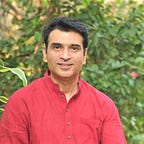Swabhava & Swadharma: Why Self-Knowledge is necessary for Self-Expression
Discovering my Natural Self
“Know Thyself” is an ancient Greek maxim. There is nothing more powerful than self-knowledge. Yet there is nothing more lacking in the world. Humans have conquered the moon, deciphered the speed of light and connected the globe with the internet. But ask any person who they are, they will most likely share their name, gender, nationality, religion, social roles and few personal traits.
In the absence of self-knowledge we mostly believe our self to be what we are told by others. We feel what is appropriate to feel. We think what the majority thinks. We do what authority tells us to do. We constantly seek permission and validation from others for our thoughts, feelings and actions.
As a 5 year old I was travelling by train with my grandfather. It was an overnight journey and I had changed into a night suit. As is typical of adults wanting to play with a child, a man came up to me and said in a dramatic voice, “At night a rat will come and enter your pyjama.” I spontaneously responded “No, the rat will come and enter your pyjama.” I then turned and looked towards my grandfather. He was looking at me sternly with big eyes, that seemed to communicate what I had said was wrong. It made me fearful and uncertain of myself.
When our natural spontaneity and innocence as children is invalidated by well-meaning adults we disconnect from our naturalness. When people around us want us to behave in a certain manner for the purpose of social decorum, appropriateness and looking good in the eyes of others, we relinquish our natural feelings for the sake of being liked by others. It is a process of socialization that everyone goes through in some degree or the other.
If, in the need to fit in, we lose touch with our Swabhava — naturalness, then we have lost the most precious thing in the world. For it is only our natural essence that can help us make choices that are beneficial to us. It is our inner compass. What is good for me may not be good for others and vice-versa. But how will I know? Only when I have an inner faculty that I can trust to guide me.
In the absence of the inner compass we are left to the whims and fancies of the world. We may end up spending a lifetime pleasing and looking good in the eyes of others. And hide the hollow emptiness within. We may seem to serve the institutions of family, marriage, corporation and nation, but in the absence of self-knowledge it is not service. We are just doing what we have been trained to do.
Our Swabhava, made up of our values, inclinations, proclivity and temperament, makes us who we are. It creates the unique character of our being. It indicates what it is to be authentic to our self. It tells us what we want. And what is not suitable to us. It tells us in which direction we must take our life.
Knowing our Swabhava is a prerequisite to knowing our Swadharma, our duty.
Everything in the Universe has a natural function. It is part of the Universal Law. The function of the Sun is to shine bright, the plants to give oxygen and the birds to fly. If we interfere with the natural role of things, we upset the natural order of life.
Swadharma is our unique contribution to the world.
The skills required for accountancy are not in my Swabhava. No matter how hard I try I can never be an authentic accountant. I can do a job as an accountant, earn a decent livelihood and even get promoted if I follow my boss’s instructions and the company policies; but no power in the world can change my Swabhava — my natural self-expression.
Interest in philosophy, psychology and personal growth comes naturally to me. It has always been there for as long as I can remember. When I am teaching, even though I am playing the role of a teacher, I am just being me. There is no effort in what I do. For me, to find my Swadharma based on my Swabhava, I had to undertake a journey of trying different roles, before finding what came naturally to me.
Swadharma is the honest expression of who we are. And the reward for doing our natural duty lies in the act itself. We feel joyful, strong and integrated. Because we are residing in our naturalness. When we try to be like someone else and adopt their path as ours, we deviate from the natural order. We become a misfit in the cosmic order of the Universe.
Swabhava and Swadharma aligns our energy to the Universal energy. We take our rightful place in the natural scheme of things.
We fit in with Existence.
***
